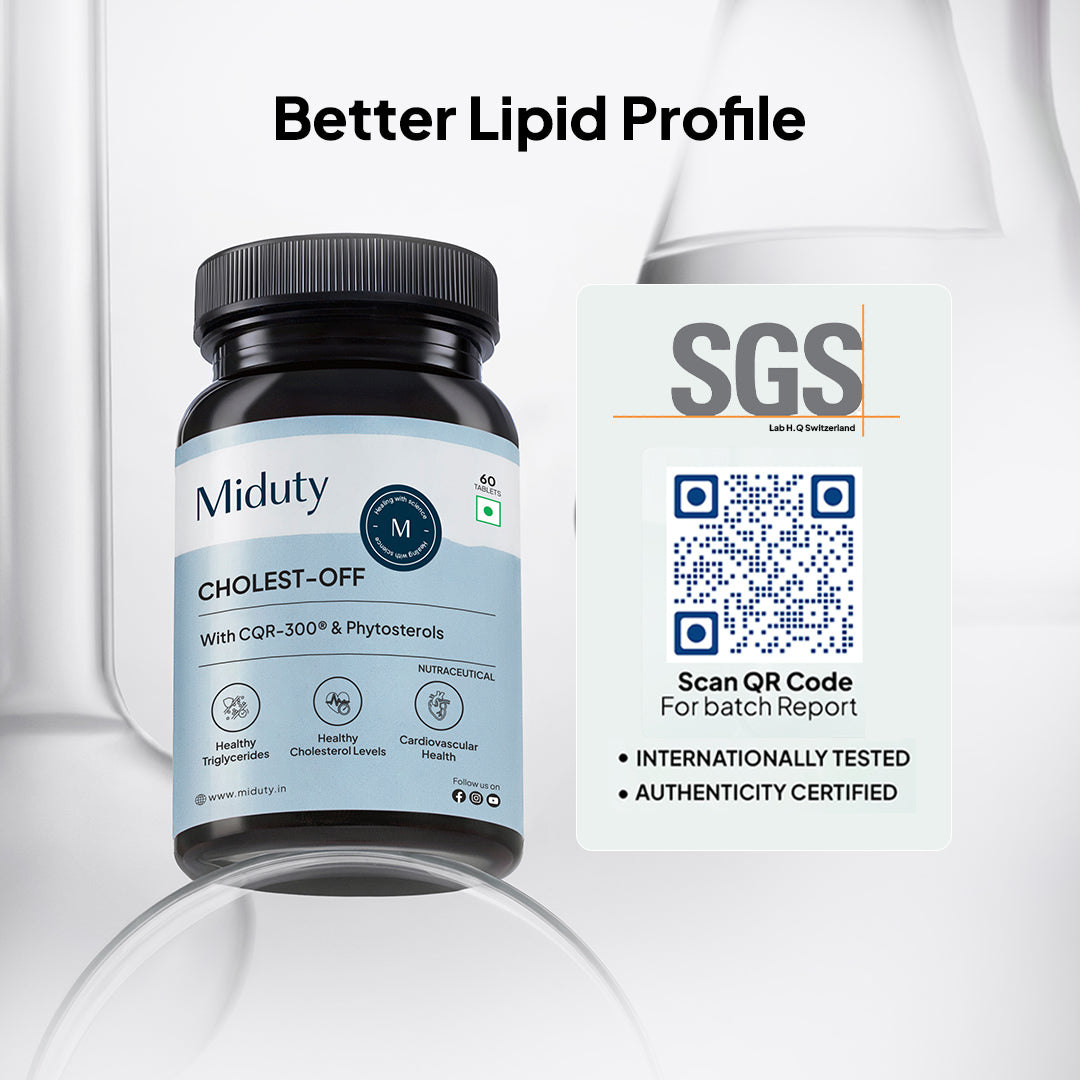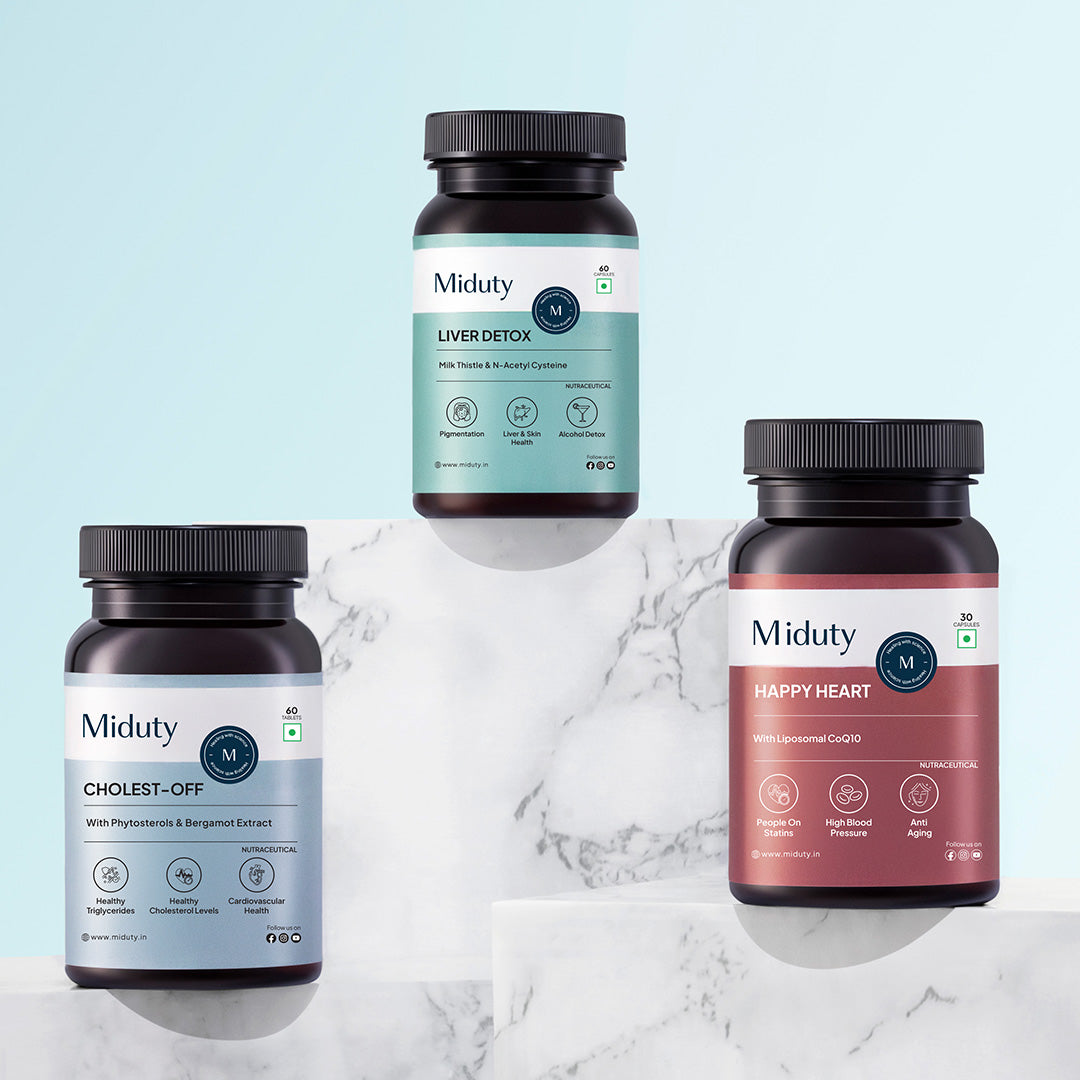
Intermittent Fasting and Heart Disease: How Are They Connected?
Heart disease is the world’s leading cause of death, but what if your meal timing could help lower the risk?
As lifestyle-related diseases surge, intermittent fasting (IF) has emerged as a promising approach, not just for weight loss, but for heart health too. Backed by research, IF can lower blood pressure, regulate blood sugar, reduce inflammation, and improve cholesterol levels. However, new studies also suggest that not all fasting schedules are equally beneficial.
A recent study presented at the American Heart Association's 2024 conference found that people following a strict 8-hour eating window (16:8 method) had a 91% higher risk of cardiovascular death compared to those with more balanced eating schedules.
So, is intermittent fasting a friend or foe when it comes to your heart?
This blog explores the science, the benefits, the risks, and how to approach IF smartly, especially if you have heart concerns.
Key Takeaways
1. Fasting Improves Heart Health Markers – It lowers cholesterol, blood pressure, and inflammation, key risk factors for cardiovascular disease.
2. Reduces Visceral Fat and Insulin Resistance – IF promotes fat burning and improves metabolic markers that affect heart health.
3. Enhances Cellular Repair – Through autophagy, fasting supports organ renewal and protects heart tissue from oxidative damage.
4. Offers Benefits for Heart Patients (With Supervision) – Intermittent fasting, when medically guided, can help manage symptoms and improve overall heart function.
5. Individualization Is Key – Not everyone is suited for IF. Always consult a healthcare provider, especially if you have existing heart conditions or are on medication.
What is Intermittent Fasting?
Intermittent fasting (IF) is a meal-timing strategy that cycles between periods of eating and fasting. Rather than focusing on what you eat, it emphasizes more on when you eat, allowing your body to shift from glucose burning to fat-burning and cellular cleanup.
It promotes metabolic flexibility, lowers insulin levels, and triggers autophagy, a powerful self-repair process where damaged cells are cleared out and replaced. Autophagy is critical for organs like the heart.
So no crash diets. No calorie counting. Just smart timing with real metabolic impact.
Different Types of Intermittent Fasting Methods
Intermittent fasting isn’t a one-size-fits-all. Here are the most common IF methods:
1. 16:8 Method: Fast for 16 hours, eat during an 8-hour window (e.g., 12 PM–8 PM). Popular but may not suit everyone, especially heart patients.
2. 5:2 Diet: Eat normally 5 days a week. Limit intake to 500–600 calories on the other 2 days.
3. Eat-Stop-Eat: Involves 24-hour fasts once or twice a week. Demanding and should be approached cautiously.
4. Alternate-Day Fasting: Alternate between full eating days and days of calorie restriction.
5. Warrior Diet: Eat small portions of raw fruits and vegetables during the day, then one large meal at night.
6. Best for heart health: The 5:2 and 14:10 methods are gentler and more sustainable for long-term cardiovascular benefits.
What Constitutes Heart Disease?
Heart disease includes several conditions affecting the heart’s structure or function:
1. Coronary Artery Disease (CAD) – Plaque buildup in arteries
2. Heart Failure – Inability of the heart to pump blood efficiently
3. Arrhythmias – Irregular heartbeat
4. Congenital Defects – Structural heart issues from birth
Often silent in the early stages, heart disease can lead to strokes, heart attacks, or sudden cardiac events if left unmanaged.
Common Causes and Risk Factors
- High Blood Pressure
- High Cholesterol
- Diabetes and Insulin Resistance
- Obesity and Visceral Fat
- Smoking
- Lack of Physical Activity
- Unhealthy Diet
- Chronic Stress
- Genetics and Family History
Intermittent Fasting and Heart Health: What’s the Link?
When you fast, your body undergoes powerful metabolic changes:
1. Fat stores are burned, reducing harmful belly fat
2. Insulin sensitivity improves, reducing blood sugar fluctuations
3. Inflammation and oxidative stress decline, supporting healthier arteries
4. Blood pressure stabilizes
5. Heart rate variability (HRV) increases, boosting resilience
These effects combine to unload the stress from your cardiovascular system, especially helpful for managing or preventing heart disease.
Impact on Cholesterol, Blood Pressure, and Inflammation
1. Cholesterol
- IF reduces LDL ("bad") cholesterol and triglycerides
- Supports better HDL ("good") cholesterol levels
- It may help reverse early-stage arterial plaque buildup
2. Blood Pressure
- Fasting improves vascular flexibility and nitric oxide production, lowering systolic and diastolic pressure
3. Inflammation
- IF reduces CRP and IL-6, key markers linked to heart attacks and strokes
- Boosts antioxidant activity, enhancing blood flow
Note: Benefits typically appear within 2–6 weeks of consistent IF practice.
Benefits of Intermittent Fasting for Heart Disease
Intermittent fasting isn’t just about losing weight; but it directly improves several risk factors for cardiovascular disease. Here’s how:
1. Weight Loss and Fat Reduction
IF promotes fat-burning, especially around the abdomen. This visceral fat is closely linked to heart disease, diabetes, and high blood pressure. Reducing it:
- Lowers inflammation
- Improves heart efficiency
- Reduces overall cardiovascular risk
2. Improved Blood Sugar Control
Insulin resistance is the root cause of many chronic conditions, including heart disease. IF helps by:
- Stabilizing blood glucose levels
- Lowerh2ing insulin concentrations
- Reducing the risk of type 2 diabetes
Over time, this eases strain on the cardiovascular system, reducing the risk of stroke and coronary blockages.
3. Better Lipid Profile
IF has been shown to lower LDL (bad) cholesterol and triglycerides, while supporting or slightly increasing HDL (good) cholesterol. This shift:
- Reduces plaque formation
- Supports cleaner, more elastic arteries
- Minimizes the risk of sudden cardiac events
4. Lower Blood Pressure
Fasting enhances vascular tone and reduces sympathetic nervous system activity, which in turn:
- Lowers systolic and diastolic pressure
- Improves endothelial function
- Reduces overall cardiovascular strain
Even modest improvements in blood pressure can cut heart attack and stroke risk dramatically.
5. Reduced Inflammation
Chronic inflammation silently damages blood vessels. IF:
- Reduces pro-inflammatory markers (CRP, TNF-alpha)
- Enhances antioxidant defenses
- Helps reduce the risk of atherosclerosis
6. Enhanced Heart Rate Variability (HRV)
A higher HRV is a marker of better cardiovascular function and stress resilience. Fasting has been shown to boost HRV, making the heart more adaptable and robust.
Can IF Help Those Already Diagnosed with Heart Disease?
Yes, with proper medical guidance, intermittent fasting can offer real benefits for those with heart conditions.
Potential benefits may include:
- Lower medication dosage requirements (due to improved vitals)
- Reduced angina or fatigue (via better cardiac output)
- Decreased risk of secondary heart events
- Better adherence to a heart-healthy lifestyle when combined with a dietary focus
Important: Patients with coronary artery disease, congestive heart failure, or arrhythmias should always consult a cardiologist before beginning an intermittent fasting routine.
Potential Risks of Intermittent Fasting for Heart Health
While IF can be beneficial, it’s not for everyone. Risks include:
1. Low Blood Sugar and Dizziness
Especially common in people with diabetes or on insulin. May lead to fainting or fatigue during fasting windows.
2. Electrolyte Imbalance
Fasting without hydration or mineral intake can affect heart rhythm. Watch sodium, potassium, and magnesium levels.
3. Blood Pressure Fluctuations
A sudden drop in BP can cause lightheadedness or fainting. This is risky for people on blood pressure meds or with pre-existing hypotension.
4. Medication Timing Conflicts
Some heart medications must be taken with food. Skipping meals or fasting can reduce absorption and effectiveness.
5. Disordered Eating Patterns
People with a history of eating disorders may find fasting triggering, leading to binge cycles or nutrient deficiencies.
6. Unsuitability for Certain Individuals
Avoid fasting if you:
- Are underweight
- Have advanced heart failure
- Are recovering from surgery
- Are pregnant, breastfeeding, or frail elderly
Safety Guidelines and Precautions
To fast safely with heart concerns:
1. Consult your cardiologist first – This is essential before beginning any dietary shift.
2. Start slow – Begin with 12:12 or 14:10 before attempting 16:8 or longer fasts.
3. Stay hydrated – Water and mineral-rich fluids prevent fatigue and imbalances.
4. Eat balanced meals – Focus on whole foods, healthy fats, lean protein, and fiber.
5. Avoid fasted overexertion – Exercise gently, especially during fasting periods.
6. Monitor warning signs – Stop fasting if you feel dizzy, weak, or experience chest discomfort.
7. Time medications carefully – Work with your doctor to adjust doses if needed.
Supportive Add-Ons to Enhance Your IF and Heart Routine
While intermittent fasting offers powerful benefits on its own, a few thoughtful additions can make the process smoother and more effective, especially when it comes to energy and cardiovascular support.
If you find it hard to stretch your fasting window or feel that black coffee isn’t cutting it, consider adding a Miduty’s Fat Burning Chai Creamer with MCT fats. It blends easily into tea or coffee, supports gentle fat burning, and helps extend your fast without spiking insulin or breaking your routine.
Additionally, to focus on heart health, CoQ10 supplementation can be a valuable companion. Make sure you take this antioxidant in liposomal form to facilitate maximum absorption in your body. It’s a nutrient naturally present in the body but often depleted with age or medication. Supporting cellular energy and heart muscle function, it may help you get the most out of your fasting and lifestyle efforts, especially if you’re dealing with fatigue or taking statins.
These small tweaks can help your body feel more supported, both during fasting and for your long-term heart health.
Conclusion
Intermittent fasting isn’t just a trendy eating pattern, it’s a science-backed lifestyle tool with the potential to significantly improve heart health. From reducing blood pressure, bad cholesterol, and inflammation to supporting weight loss and metabolic balance, IF targets nearly every major risk factor for cardiovascular disease.
However, the key lies in personalization and safety. While many benefit from intermittent fasting, it’s not suitable for everyone, especially those with complex health conditions or on specific heart medications. Recent studies also warn against extreme or prolonged fasting windows (like the 16:8 method) without medical supervision, as they may carry increased cardiovascular risks for certain individuals.
If you’re considering intermittent fasting to protect your heart or manage an existing condition, start slow, monitor your body’s response, and always consult a healthcare provider. With the right guidance, IF can be a gentle, effective addition to your heart health toolkit, supporting not just longevity, but a higher quality of life.
FAQs on Intermittent Fasting & Heart Health -
Q1 - Is intermittent fasting linked to heart disease?
Current research suggests intermittent fasting may lower the risk of heart disease by improving factors like blood pressure, cholesterol, and inflammation.
Q2 - Does fasting reduce heart problems?
Yes, fasting can reduce heart problems by lowering cholesterol, improving insulin sensitivity, and reducing inflammation, all important risk factors for heart disease.
Q3 - What is the best fasting method for heart health?
A common and sustainable approach is the 16:8 intermittent fasting method, where you fast for sixteen hours and eat during an eight-hour window.
Q4 - Is fasting OK with heart disease?
Gentler protocols like 14:10 or 5:2 tend to be more sustainable and better tolerated for heart patients. Strict fasting windows like 16:8 may not be suitable for everyone.
Q5 - Does intermittent fasting raise cholesterol?
In most cases, yes, intermittent fasting is safe for people with stable heart disease, but it’s important to consult a doctor before starting.
References












